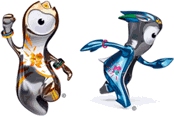题目内容
Baron Pierre de Coubertin was a Frenchman. At his time sports were not taught in French schools. De Coubertin believed that sports should go hand in hand with studies. He had an idea. His idea was to begin the Olympics all over again.
Sports teachers of other countries liked de Coubertion’s ideas. So in 1896, the modern Olympic Games were held in Athens(雅典), Greece. Since then the Olympics have been held once every four years, except three times, when there were wars.
Before the start of the Olympic Games, runners carry lighted torch(火炬)through many nations towards the stadium(运动场)where the games will be held. These sportsmen are from different countries. Yet they work together to carry the Olympic torch. It is passed from runner to runner. When the last runner enters the stadium, he or she places the torch in a special(专门的)basin filled with oil. It catches fire. It is then, only then, that the Olympic Games can begin.
The Olympic flame(火焰)burns throughout the games. It is the flame of peace.
56. Before 1896 French schools didn’t teach .
A. maths B. history C. sports D. physics
57. De Coubertin .
A. was the first man to start the Olympic Games
B. helped start the modern Olympic Games
C. believed that sports were less important than studies
D. failed to begin the modern Olympic Games
58. According to this passage, the third modern Olympic Games should have been held in .
A. 1915 B.
59. “Marathon” in this passage is .
A. a foot race B. a jumping contest(比赛)
C. field sports D. a boxing(拳击)match
60. Which of the following is NOT true?
A. The Olympic Games don’t begin until the basin of oil catches fire.
B. The torch is carried from runner to runner through many countries.
C. Runners who carry the torch can be men or women.
D. After the start of the Olympics, the Olympic flame is put out.
56―60CBDAD
57. 文中得知,De Coubertin赞同运动,他的主意是重开Olympic Games。但是他并不是第一个开始奥林匹克运动会的人,他只是为重开此运动会作了些努力。因此A项是不正确的。
58. 第一届运动会1896年召开,而且从那以后每四年(every four years)举办一次,因而推断第三届应于1904年举行。
59. 运动项目中有径赛(foot races)和田赛(field sports)。文中提及Marathon为the longest race,所以属于径赛。

| |||||||||||||||||||||||||||||||||||||||||||||
